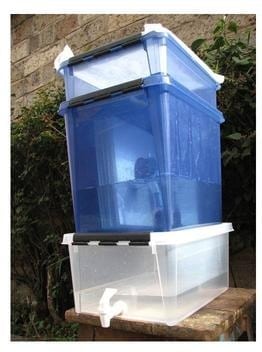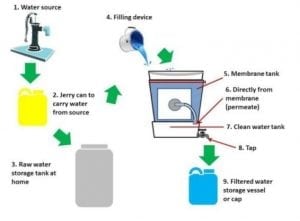Product Description
EAWAG is an ultrafiltration low-pressure system for household water treatment. Ultrafiltration is an effective technology to treat water and can be applied on a decentralized scale. Most ultrafiltration membranes have pores, which are smaller than the size of bacteria and viruses. Thus, water filtered through these membranes is micro-biologically safe.
Target Users (Target Impact Group)
Distributors / Implementing Organizations
EAWAG - Swiss-based and internationally active research institute within the ETH domain (Swiss Federal Institute of Science and Technology)
Manufacturing/Building Method
Intellectural Property Type
Trade Secret
User Provision Model
Purchase directly from the manufacturer
Distributions to Date Status
24 as of May, 2011. Distribution of 3000-5000 systems within a carbon credit project in Uganda and Kenya was slated for 2013 by scaling up the production.
Manufacturer-specified flow rate (L/hr)
2-5 L/hr
Bacteria reduction
Unknown
Virus reduction
Unknown
Protozoa reduction
Unknown
Effluent turbidity levels (NTU)
Unknown
Material of construction
Food grade plastics, BIO-CEL® membrane sheets.
Safe water storage capacity (L)
Y
Manufacturer-specified lifetime volume (L)
Unknown
Design Specifications
In gravity-driven membrane (GDM) technology, no backflushing or cleaning is used. Pressure necessary to press water through the membranes is generated by gravity, which is generated by difference of water levels between two storage tanks. As a feed, natural water (river, spring, well or rainwater) can be used without pre- or post-treatment. BIO-CEL® membrane sheets with a pore size of 40 nm are placed vertically inside the membrane tank. The sheets are manufactured by Microdyn-Nadir and are usually employed in membrane bioreactors for wastewater treatment. Although turbid waters can also be used, a pretreatment is required if the water becomes extremely turbid (> 500 NTU). The clean water tank has dimensions for a total volume of 10 liters, the membrane tank has dimensions for 20 liters.
Technical Support
Replacement Components
Unknown.
Lifecycle
Expected life span 5-8 years (This has not yet been tested)
Manufacturer Specified Performance Parameters
48 L of safe drinking water per day only with 0.5 m^(2) of membrane, which is sufficient to cover drinking water needs of a family. The Kenya trials were conducted with household filter prototypes with a target capacity of 2-5 L per hour. GDM systems can be operated with turbid water (up to 100 NTU) or high organic matter content (including diluted wastewater with a TOC of about 12 mg/L). Membranes used in GDM systems entirely remove protozoa and bacteria, and preliminary data shows 99.99 % retention of viruses
Vetted Performance Status
Unknown
Safety
Field observations are strongly indicating high recontamination factors linked with maintenance and unsanitary conditions.
Complementary Technical Systems
Redesigning of the tap might help prevent recontamination risks
Academic Research and References
Akhondi, E., Wu, B., Sun, S., Marxer, B., Lim, W., Gu, J., Liu, L., Burkhardt, M., McDougald, D., Pronk, W., Fane, A. G. 2015. Gravity-driven membrane filtration as pretreatment for seawater reverse osmosis: Linking biofouling layer morphology with flux stabilization, Water Research, 70, 158-173, dx.doi.org/10.1016/j.watres.2014.12.001.
Several published papers dating back to 2009 are listed here under the “download” button.
Compliance with regulations
WHO Guidelines 2011 for drinking-water quality have been cited in this report.
Get more information about Solutions Library and its features.
Learn MoreHave thoughts on how we can improve?
Give Us Feedback
